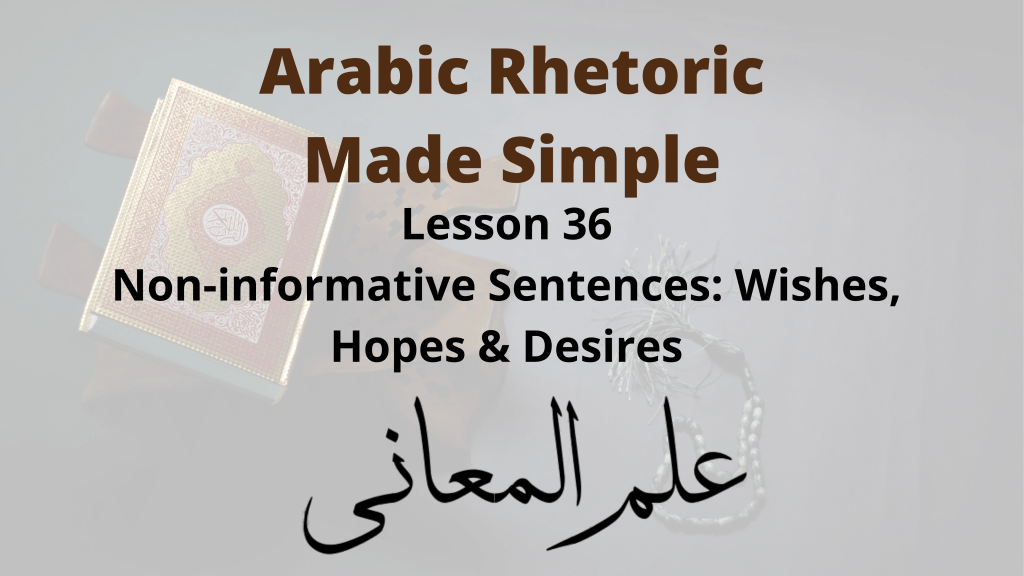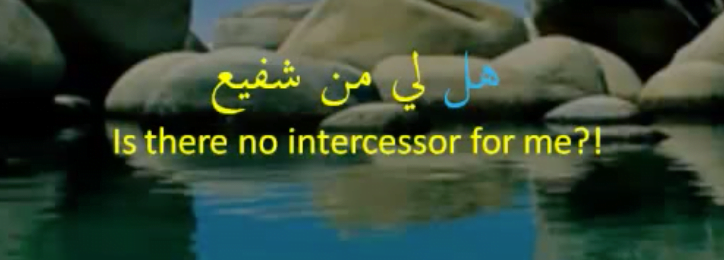In this lesson on Balagha, we are moving onto the next chapter about non-informative sentences. We will start by talking about expressions of hope and desire.

Table of Contents
Introduction
As you probably know, Arabic sentences can be divided into informative and non-informative sentences.
An informative sentence (جملة خبريّة) is one in which information is being conveyed.
For example: I am going for a walk.
A non-informative sentence (جملة إنشائيّة) in Arabic is a sentence in which information is not being conveyed. These are things like commands, questions, emotional expressions etc.
For example: Can I go for a walk?
I am not trying to inform you of anything here. I am just asking a question, even if you did happen to get some information out of it.
There is a simple test that can tell you whether a sentence is informative or non-informative. Informative sentences have true and false, while non-informative sentences don’t.
For example, when I say “I am going for a walk”, you can say “Yeah, that’s true”, or “No, that’s a lie”. So you know this is an informative sentence.
But when I give a command, like “Go to the park”, or I ask a question like “Can I go to the park?”, you can’t say “That’s true”, or “That’s a lie”. It doesn’t make sense. So you know this is a non-informative sentence.
There are several types of non-informative sentences. Some we have already mentioned like questions, commands and emotional expressions. There are others as well, like when you call someone: “Hey Khalid”. Or when you wish for something: “I wish I didn’t have to go”. There are a few more types of non-informative sentences.
Types of Non-Informative Sentences
In balagha we divide non-informative sentences into two major categories.
- The first is those types of sentences in which something is being sought or requested. These are called طلبي.
- The second is those in which something is not being sought or requested. These are called غيرطلبي.
طلبي sentences are the focus of balagha. There are four types of جملة إنشائيّة that we discuss under the umbrella of طلبي. They are:
- Wishes (because when you wish for something you seek the thing you wish for).
- Questions (because when you ask a question, you seek an answer).
- Commands (because when you command someone, you seek for an action to be completed or enacted).
- Calls (because when you call someone, you seek their attention).
Wishing/ Hoping with لَيْتَ
Today we focus on wishes. In Arabic this is called تمنّي.
تمنّي is where you express desire for something, either impossible or at least extremely unlikely. The most common word for this in Arabic is لَيْتَ.
For example you would say: لَيْتَ الشّبابَ يَعُود (I wish I could be young again).
Or if you want, “If only I could be young again”.
Or alternatively if you want: “Would that I could be young again”.
Notice that becoming young again is impossible.
Wishing/ Hoping with لَعَلَّ
Another expression of desire in Arabic is called ترجّي.
ترجّي is where you express desire for something that is either unlikely or likely, but not impossible. In English, we refer to this more commonly, not as wishing but as hoping. The most common word for this in Arabic is لَعَلَّ.
For example: لَعَلَّهُ يَزُورُنِي (I hope he visits me).
Notice that someone visiting you is well within reason. It is not impossible.
The word لَعَلَّ can actually be used for both تمنّي and ترجّي. So now we have two words we can use for تمنّي.
Wishing/ Hoping with هَلْ
A third word for expressing تمنّي is هَلْ.
Notice that هَلْ is typically used in questions. Like when Jahannam asks Allah: هَلْ مِنْ مَزِيد (Are there any more?)
But it can also be used for wishing, like when the disbeliever will say on the Day of Judgement:

So he knows there is no intercessor for him, but he wishes beyond all hope that there would be. Now the reason he uses هَلْ as opposed to لَيْتَ in the context of تمنّي (wishing) is for the very reason that هَلْ is used for questions.
When you have تمنّي for something, you know that thing is impossible. Or at least extremely unlikely. Like the example of youth returning. But when you ask a question, you don’t know which way it will go. That is why you are asking the question. Both are possible.
By using a question word in the place of a wish, the disbeliever is pretending there is some hope for him and this shows his complete desperation, and to find any inkling of hope that there may be. In Arabic we call this reducing the impossible to the level of the possible. And the purpose is to show complete and utter desperation.
Wishing/ Hoping with لَوْ
A fourth word for expressing تمنّي is لَوْ.
Notice that لَوْ is typically a conditional, similar to the English word “had”.
For example: لَوْ أَتَيْتَنِي لَأَكْرَمْتُكَ (Had you come to me, I would have honoured you).
It can also be used for wishing.
For example, someone might wish to visit the Prophet’s (peace be upon him) grave. He might say:

When لَوْ is used in this way, the jawaab of لَوْ must be preceded by a ف.
The reason لَوْ is used in the context of wishing and hoping is because in its conditional form it conveys the non-occurrence of something in the past.
When I say: “Had you visited me”. Obviously, the understanding is that you didn’t visit me. And the non-occurrence of something in the past is the strongest form of impossibility. So the word that is used in this context of the strongest form of impossibility is also used in the context of تمنّي, to show that the thing I am wishing for is way beyond anything I could ever hope for.
- Proceed to next lesson: Non-Informative Sentences: Interrogative Words & Rhetorical Questions
- Return to index page: Intro to Ilm Ul-Ma’ani
- Start free lessons: Sign Up for Free Mini-class